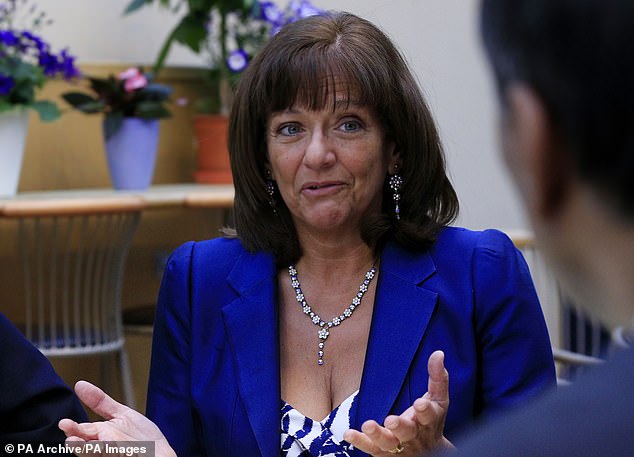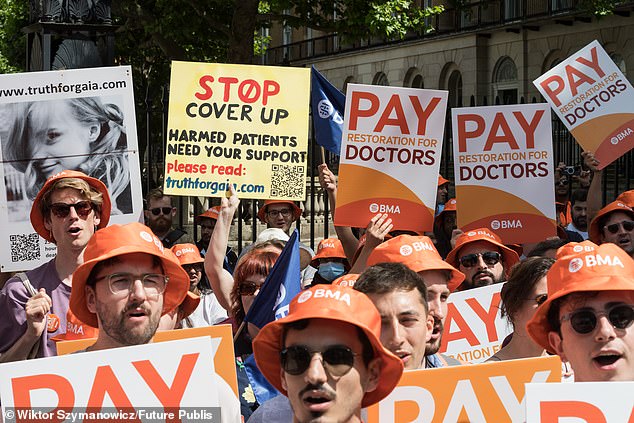Junior doctors have received a £177,000 pension boost each under a Government pay deal that will see their earnings rise by a whopping 22 per cent, The Mail on Sunday can reveal.
The real cost of this pay rise for 75,000 doctors could mean an extra bill of £13bn for taxpayers to fund their generous pensions, according to our analysis.
The rise of young doctors comes at a time when retirees are seeing their incomes shrink, while private-sector workers brace for a fiscal attack on their retirement savings.
Chancellor of the Exchequer Rachel Reeves admitted that “difficult” cuts were urgently needed to fund public sector pay rises, estimated at £9.4bn, but did not address the extra pension bill taxpayers will have to foot as a result.
Junior doctors take part in a demonstration outside Downing Street in June. They have now received a £177,000 pension increase thanks to the Government’s pay deal
Junior doctors’ annual pension incomes will rise by £8,852 on average following the pay deal, taking into account 1.5 per cent inflation, this newspaper’s calculations show.
Over 20 years of retirement, this adds up to an additional pension income of £177,031, a calculator created for The Mail on Sunday reveals.
Graham Crossley, NHS pensions expert at Quilter, creator of the calculator and who is in favour of the pay deal, says: “The 22 per cent pay rise for junior doctors is a crucial step towards addressing several urgent challenges facing them.
the NHS.
‘This increase helps mitigate retention issues that have plagued the healthcare system and recognizes the critical nature of this section of the workforce in meeting the needs of the nation.
“These doctors are the future consultants and specialists, and supporting them now ensures a well-trained and motivated workforce, which should also benefit from a good pension package.”
The NHS pension scheme, one of the most generous in the country, pays a guaranteed income in retirement that increases annually with inflation. Younger doctors save for average pensions over their careers that increase by 1/54 of their salary a year and will pay them a proportion of their salary until they die.
This means that younger junior doctors in their first year of practice (whose salaries will rise by more than 24 per cent over two years, from £29,384 to £36,616, according to the British Medical Association) will accrue an extra £134 in pension income for every year they work. On retirement, this would add £7,874 to their annual pension income (£157,475 over 20 years).
The most experienced junior doctors, whose salaries will rise by £12,027 to £70,425, will see their pension income grow by £191,243 in retirement.
These taxpayer-funded pensions are far more valuable than modern private defined contribution plans.
Still, some doctors want the pay deal rejected and are pushing for more strikes unless ministers give in to their demands for a 35 per cent rise. This would mean a £282,000 increase in the average junior doctor’s pension, at an estimated total cost to the taxpayer of £21 billion.
This reaction is an insult to the rest of the UK workforce, who can only dream of such pensions and will have to fund them.
Former pensions minister Guy Opperman previously admitted that public sector pensions were “unsustainable” and needed reform.
Baroness Ros Altmann, also a former pensions minister, said: ‘Public sector workers do not realise how generous their pensions are or the full cost taxpayers pay to fund them.
“Meanwhile, the government is punishing pensioners who have little more than the state pension. They are increasingly tilting the deck in favour of public sector workers.”
Minutes after announcing the pay deal, the Chancellor stripped 10 million pensioners of their winter fuel allowance, the first in a series of cuts she said would help shore up public finances.
From this winter, money for vital fuels will be based on means-tested income and limited to those in receipt of a pension credit. The move is expected to save £1.5bn a year.
However, the full pension increase for just one junior doctor could pay for the £300 a year winter fuel allowance for the current 590 pensioners.
Baroness Altmann said: “It is a mistake to try to balance the books at the expense of pensioners. Many will struggle to get by. It is a serious error of judgement to suggest that the Government sees pensioners as easy targets for attack.”

Baroness Ros Altmann, also a former pensions minister, says: “Public sector workers don’t realise how generous their pensions are”
Dennis Reed, of the over-60s campaign group Silver Voices, says: ‘Money can be found to pay what may be justifiable pay rises for public sector workers, but a much smaller amount of money cannot be found to help with essential pension benefits.
“Pensioners cannot strike, so we are an easier target. In the Chancellor’s speech, no one else was asked to make a sacrifice.”
Reeves has already confirmed that the government will raise some taxes in the October budget. Labour has promised not to raise income tax, national insurance or VAT.
With little else to attack, he is expected to launch a tax raid on retirement savings, inheritances and assets (see pages 50-51).
Private sector workers’ pensions are likely to be among the first casualties. Some left-leaning think tanks are urging Reeves to raid what they see as easy prey.
This could further widen the already huge gap between public and private sector pensions.
According to the Association of Pensions and Life Savings, up to 72 percent of workers do not save enough to receive even a moderate pension. Most of them have private sector pensions.
Analysis by Wealth has found that for every £1 a worker saves into their pension, NHS workers receive £5.57.
However, most workers receiving a typical private sector pension could receive as little as £1.75 for every £1 they set aside – less than a third of what NHS workers enjoy.
- Share your thoughts: jessica.beard@mailonsunday.co.uk
Some links in this article may be affiliate links. If you click on them we may earn a small commission. This helps us fund This Is Money and keep it free to use. We do not write articles to promote products. We do not allow any commercial relationships to affect our editorial independence.

